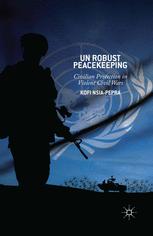

Most ebook files are in PDF format, so you can easily read them using various software such as Foxit Reader or directly on the Google Chrome browser.
Some ebook files are released by publishers in other formats such as .awz, .mobi, .epub, .fb2, etc. You may need to install specific software to read these formats on mobile/PC, such as Calibre.
Please read the tutorial at this link: https://ebookbell.com/faq
We offer FREE conversion to the popular formats you request; however, this may take some time. Therefore, right after payment, please email us, and we will try to provide the service as quickly as possible.
For some exceptional file formats or broken links (if any), please refrain from opening any disputes. Instead, email us first, and we will try to assist within a maximum of 6 hours.
EbookBell Team

4.8
84 reviewsThis book examines the emergent conviction that UN robust peacekeeping works better than UN traditional peacekeeping in reducing civilian killings within contemporary post-cold war violent civil wars. In an unprecedented study, Nsia-Pepra has systematically and empirically documented the relationship between robust peacekeeping and civilian killings in violent civil wars using both statistical and case study models. His research, engagingly expounded upon in UN Robust Peacekeeping, indicates that robust peacekeeping works better than traditional peacekeeping in lowering civilian killings by spoilers in violent civil wars. His book also presents the concept of a formidable barrier model of robust peacekeeping success using the game theoretical model. It makes policy recommendations to enhance the UN's capacity to protect civilians from human rights violations, including a unified, coherent doctrinal definition for robust peacekeeping, an operational doctrine on the use of force, and improved UN intelligence capacity. Nsia-Pepra also suggests employing the GA 1950 Uniting for Peace Resolution as well as robust mandates, common training doctrine, pre-deployment training, improved UN intelligence capacity, major power participation, implementation of R2P and US objective global leadership.